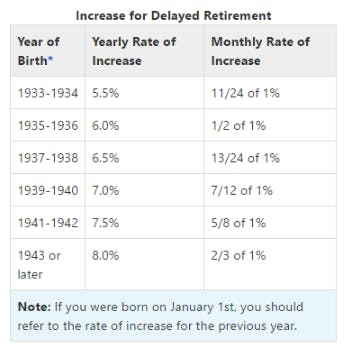Deciding when to retire is more complicated than you might think. There are many factors that go into this major life transition. This step-by-step approach will guide you to a best retirement age estimate. Start with these questions:
How much are you currently spending?
How much will you spend in retirement?
What will your Social Security payment be at various tentative retirement dates?
Will there be a gap between expected retirement income and retirement expenses?
We’ll explain each of these questions below. Once you have an idea about your current and future financial picture, you’ll want to use a retirement calculator for more detailed retirement estimates.
How much are you spending now?
Understand that how much you’re spending now is a baseline for what you’ll need in retirement. Although some say you need 60% or 80% of your current income in retirement, each case is different. It’s best to take a one to six-month view of your spending to use for your retirement projections.
My favorite way to keep track of spending is with an online or desktop software program such as Mint or Quicken. Although they’re not perfect, these types of offerings give you a sense of control over your spending. It’s helpful to see that you spent $200 last month dining out and this month you’re on track to spend $400 on restaurant dining. Look at the major spending categories today, and be honest about what your spending now.
Clearly, some of today’s spending categories will change in retirement. You’re not going to be paying for Junior’s college tuition in retirement. In fact, it’s likely that the kids will have moved out by the time that life stage rolls around. Other expenses that may dwindle are clothes and some shopping categories. If you own a home, your mortgage might be paid off by the time you retire. On the flip side, there’ll be budget categories tomorrow that may swell in contrast with today; healthcare, travel, and dining out may increase. Use today’s spending calculations as a starting point for tomorrow’s budget.
How much will you spend in retirement?
This is a forecasting question, so don’t expect your answers to be perfect. You’re looking for a reasonable estimate here. Certain expenses may be easier to estimate, such as dining out, travel, and housing expenses. Others, such as medical expenses may vary wildly be more difficult to predict.
If you’re like the average American, you’ll retire some time between ages 60 and 70 and live an additional 20 to 30 years in retirement. Thus, a one-size fits all budget won’t work for your entire retirement. During the first phase of retirement, you’ll likely be more active.
According to Darrow Kirkpatrick in this Money.com article, “How to Figure Out Your Real Cost of Living in Retirement".
"Among older Americans, average annual expenditures peaked at about $61,000 for those in the 45-54 year age range, according to the latest data from the Consumer Expenditures Survey. By ages 55-64, spending dipped to $56,000, and down again to $46,000 between ages 65 to 74. At 75 years and older, average spending was only $34,000, though health care expenses may spike up for many.”
Certainly, where you live has a great impact on your retirement spending. Live in New York City or Los Angeles and you’ll be spending a lot more than the retiree living Blacksburg, Virginia or Corpus Christi, Texas. In sum, come up with a retirement spending estimate by guesstimating average spending in each category.
Now that you have a baseline of projected costs, you’ll need to figure out how to fund your retirement.
Next stop, Social Security
The Social Security Retirement Planner is like a one stop shop for everything retirement.
You’ll get all of this information at the Social Security site:
Your full Social Security retirement age
An estimate of your life expectancy
An estimate of your retirement benefits
Information about various Social Security programs
The impact of working in retirement on your taxes
How certain earnings and pensions can affect your retirement income
Armed with data and information from the Social Security website you’ll be able to better predict your best retirement age. For your next calculations, do a ‘what if’ scenario for several possible retirement ages. Take your key Social Security benefit amounts for several years between age 62 and 70; i.e. full retirement age, age 70 and a few additional years between age 62 and age 70.
Next, add in any other sources of income you might expect. Maybe you have a state, federal, or employer pension. We’ll get to your retirement accounts and savings accounts later. Now you have a tally of your guaranteed income stream at several points in time.
Retirement income versus projected expenses
Here’s where you compare your projected income streams with your estimated expenses.
Take a look at this example:
As a baseline, Marilyn decided to find out how much Social Security she could expect if she retired at age 66 and 2 months. At that age, the Social Security calculator projected her monthly retirement benefit at $2,000 per month or $24,000 per year. She had a small monthly pension from a former employer of $200 per month, boosting her monthly retirement income stream as $2,200 per month or $26,400 per year. She expects to retire near her children in South Carolina and projects her annual living expenses at $44,000 per year or $3,667 per month. That’s a deficit of $1,467 per month or $17,607 ($3,667 - $2,200).
Estimated income deficit in retirement? Adjusting your retirement age
The first retirement income versus expense calculations are a beginning, not an end point. If your projected retirement expenses are greater than your retirement income at a particular age, then you have several options.
First, you can play around with the projected retirement age to determine how much your Social Security payment will rise. Social Security lays out the percent benefit increase you’ll receive for waiting each year beyond the full retirement age. If you were born after 1943, your retirement benefit increases 8% annually for each year you delay receiving benefits between your full retirement age and 70 years old. Once you hit age 70, the annual increases stop and your benefit amount remains the same.
The takeaway: Figuring out when to retire
The steps to figure out when to retire aren’t fixed in granite. Yet, throughout your life, it’s wise to do some periodic planning to see just how long your 401(k) account will last in retirement. Although Social Security won’t go away, it also won’t support most American’s lifestyle in retirement. Every decade or so, spend some time going through the process of estimating a best age for retirement so you won’t have any surprises as you approach this important life stage.

If you’d prefer not to delay retirement, you may want to consider working part time in retirement or moving to a lower cost of living area. There are many additional ways to slash costs, if you’re set on retiring earlier.
How much money will my 401(k), other retirement accounts and savings contribute?
Back to Marilyn, who has a $17,607 annual gap between income and expenses in her retirement projection. For example, if Marilyn hopes to leave a legacy to her heirs, expects to earn 6% return on her investments and needs the annual payment for 25 years, then she’ll need a nest egg of approximately $225,000. This Fidelity Guaranteed Income Estimator can help you understand how much of a retirement nest egg you’ll need in order to generate a given annual payout.
For those of you with additional savings and investments, retirement is the time to use those moneys. Many retirement calculators can give you an estimate of how much you can spend each year given certain assumptions. There is an old rule of thumb that states you can spend 4% of your savings each year in retirement. That may or may not hold true as the returns on your assets and lifespan will impact how long your nest egg will last. In general, use several retirement calculators to figure out how much is feasible to withdraw each year.
Further reading and sources:
Image credit: Jay Mantri
Low-cost 401(k) with transparent pricing
Sign up for an affordable and easy-to-manage 401(k).

Article By
Barbara A. FriedbergVeteran portfolio manager, expert investor, and former university finance instructor. She has authored 3 money/investing books. Friedberg also owns the financial websites RoboAdvisorPros.com and BarbaraFriedbergPersonalFinance.com.


